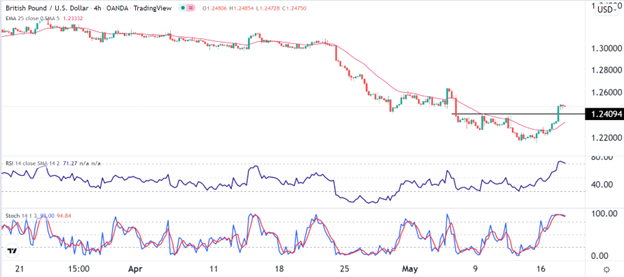[ad_1]
The pair will likely retest the support at 1.2400 and then extend its gains.
Bullish View
- Buy the GBP/USD pair and set a take-profit at 1.2600.
- Add a stop-loss at 1.2355.
- Timeline: 1 day.
Bearish View
- Set a sell-stop at 1.2400 and a take-profit at 1.2350.
- Add a stop-loss at 1.2500.
The GBP/USD pair found some support at its lowest level since May 2020 after the strong UK employment numbers. It rose from this week’s low of 1.2170 to a high of 1.2495. Focus now shifts to the upcoming UK inflation data.
UK Retail Sales Data
Recent economic data from the UK is sending a mixed picture of the economy. For example, recently, data showed that the country’s retail sales declined for the fourth straight month. Another metric revealed that the country’s economy barely grew in March.
At the same time, data published on Monday showed that the labor market continued to strengthen in April. The numbers revealed that the country’s unemployment rate declined to the lowest level in since 1974.
The sharp decline of the unemployment rate coincided with an increase in wages in the country. Wage growth that excludes bonus increased from 4.1% to 4.2%. With bonuses included, the country’s inflation rose from 5.6% to 7.0%.
The next key catalyst to watch will be the upcoming UK inflation data. Economists polled by Reuters believe that the headline consumer price index rose from 7.0% to 9.1% in April as the price of fuel jumped. Excluding food and oil, analysts expect the data to show that the country’s inflation rose from 5.7% to 6.2%.
The same trend is expected to be seen in the producer sector. They expect that the PPI input and output rose by 19% and 12.5%, respectively. These numbers will come two days after the BOE governor warned that inflation will continue rising even as it continues hiking interest rates.
The GBP/USD pair will react mildly to the latest US building permits and housing starts data. Estimates are that these numbers declined slightly in April.
GBP/USD Forecast
The GBP/USD pair formed a rounded bottom pattern after the strong UK unemployment rate data. As it rose, the metal moved above the important resistance level at 1.2400, which was the highest level on May 9 and 10. It has risen above the 25-day moving average while oscillators like the Relative Strength Index (RSI) and Stochastic have risen to the overbought level.
Therefore, the pair will likely retest the support at 1.2400 and then extend its gains. If this happens, the next key resistance level to watch will be 1.2600.

[ad_2]